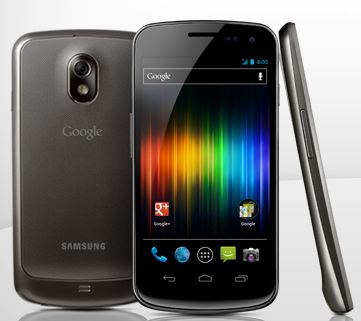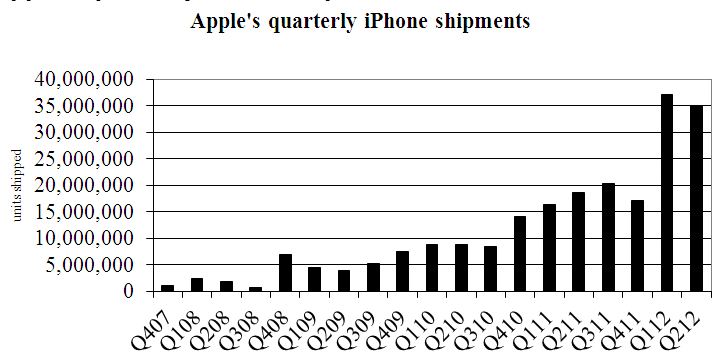25 April 2012
 I just bought a brand new Galaxy Nexus on Google’s new play store today (https://play.google.com/store), very excited to have an unlocked GSM phone that I can take with me around the world. Better yet, I can now take advantage of Google wallet and many new NFC based applications.. independent of any carrier (… although the Sprint people are A+).
I just bought a brand new Galaxy Nexus on Google’s new play store today (https://play.google.com/store), very excited to have an unlocked GSM phone that I can take with me around the world. Better yet, I can now take advantage of Google wallet and many new NFC based applications.. independent of any carrier (… although the Sprint people are A+).
This week, I was struck by how similar the carriers “walled garden” NFC strategy is to previous attempts to create a “Walled Garden” . Why are the MNOs recycling the same control strategy? Remember Einstein said “the definition of insanity is doing the same thing over and over again, but expecting different results”. As background, VZ (and most MNOs) love the “walled garden” strategy.
Version 1(2004-Present). BREW platform from Qualcomm (dumb phones).
Version 2 Handset capabilities
- Verizon invested over $300M in GPS “platform”, an investment they planned to recover by charging for Apps that wanted to use GPS. RIM was the first to realize that it could not deliver consumer features at odds with what VZ would authorize.
- Firethorn was the first payment related application that VZ promoted. Objective was to limit all consumers to Firethorn as the only approved “signed application” where consumers could check their bank balance. Banks were each asked for $1M to allow for their customers to check their balances on this MNO controlled application.. yeah.. great idea (2007)
- Search. $600M exclusive deal w/ MSFT in 2009. Unfortunately for MSFT, Android was not included agreement and then VZ make “Droid” THE key marketing theme.
- I could go on.. but
Version 3 NFC
- Control SE (http://tomnoyes.wordpress.com/2011/02/03/isis-platform-ecosystem-or-desert/)
- ISIS. Consensus is that the carriers will keep plugging along at this for 10 years.. however without talent, retailers and handsets I don’t see how they can sustain investment.
- Create a new BREW.. handset platform that leverages NFC and secure customer data.. payment (ISIS) is just one of the applications. Note that most carriers are in midst of issuing RFPs for SE management (my vote is for Sequent here). The objective of this effort is to create a “secure platform” where applications can leverage customer data (for a fee).
Would you want to “play” in a walled garden? The owner gets to make the rules and take the rug out from under your feet (ie MSFT $600M). Where the star (ie Apple) is able to negotiate special treatment or go over the top without you ever being aware? No way.. you can’t run a business like this. I wouldn’t even want to play..
Carriers must think about value creation before they can think about control. Apple earns its margin from brand and experience… they are not forcing people into their store. For example, the Samsung Galaxy Nexus is an unbelievable phone… easily on par with the iPhone.. But the carriers won’t let it in the market unless Google give them the keys to the SE. It’s just crazy…My 11 yr old son can guess what happens next.. Google starts selling the phone directly (which I bought today). As most readers know, the US handset market is a very strange place (handset subsidies and post paid plans). The rest of the world buys their handsets and selects the carriers based upon cost/coverage. What if Google and Apple were to subsidize handsets through marketing, as opposed to anticipated spend? If telephone calls and data were routed through wi-fi whenever available? What do carriers have left?
Every point of “friction” which carriers create.. FURTHER ERODES their future profitability as this friction improves the profitability and market opportunities for companies going above, around and under them. Carrier business culture and experience all surrounds the walled garden “control” approach. This control approach works well for Apple as it has developed an integrated value proposition.. It does not work for the carriers that offer connectivity. To expand beyond connectivity carriers must create new services.. the must become orchestrators of value.. not controllers of handsets. In other words they need to shift from a “permission/transaction/payment” paradigm to one of discovery->need->->fulfillment. (see my previous blog).Attention US Mobile operators… today your trajectory is headed toward dumb pipes. You cannot deliver value through control.. no one trusts you.. and you can’t sustain investments to compete against Google, Apple, Facebook, …
What should you do? Where is the revenue opportunity? It is in value orchestration. You have direct consumer relationships… leverage them for marketing, authentication, personalization, awareness. The good news is that Hardware will peak and reach a “good enough” stage. If hardware is a commodity, then brands will begin to deteriorate.. and value orchestration will shift further from the handset node into the Cloud. If any operator agrees with this.. then ask why on earth are you locking all of this customer data inside a phone (NFC) where it cannot be used or sync’d with the cloud.
I will get off my soap box now.
BTW.. AT&T I fully appreciate that you can disable my new Nexus.. please dont make me go to an MNVO.. just another point of friction.

“Note that most carriers are in midst of issuing RFPs for SE management (my vote is for Sequent here).”
I came across Sequent several times – one way or another – during the past few months. Yankee Group put them into the “Uber-TSM” category. How did they manage to get that “status” in such a conservative industry – considering how many long-established TSMs are out there?
Sequent expands greatly from a formal TSM role. They will be successful regardless of who actually serves as TSM. They provide a framework and platform for managing the SE. Payment is but one minor application.
I’d agree on the hardware peaking idea – was at Barcelona MWC and saw some unbelievable handsets. Apple will have relative headwind on that play. Jury out though on the overall eco sytem play they bring which continues to surprise – ipod to iphone to ipad and imac. And the rumoured push into iTV. Fundamentally that model is another walled garden like that of the telcos where Apple is in control so it is possibly in question. Still, it has some time to play through till Apple is an innovator.
Tom,
Couldn’t agree more. I linked the article that started my thinking on this subject back in September of 2007.
http://www.portfolio.com/views/columns/2007/09/17/Cellphone-Carrier-Breakups
Pingback: Google Wallet Thoughts « FinVentures
Pingback: Apple Passbook: No NFC Here… « FinVentures
Pingback: Random Thoughts: Settlement, NFC and CLO « FinVentures
Pingback: Google Wallet 2.0 – The Winners « FinVentures
Pingback: Google Wallet 2.0 – Who are the loosers? « FinVentures
Pingback: Battle of the Cloud – Part 2 « FinVentures
Pingback: Gemalto QR Codes.. One Giant Leap _________ ? « FinVentures
Pingback: MNOs giving away Billions to Banks. | FinVentures
Pingback: Network War – Battle of the Cloud Part 4 | FinVentures
Pingback: CEO View – Battle of the Cloud Part 5 | FinVentures
Pingback: Payments Part of OS: What does that mean? | FinVentures